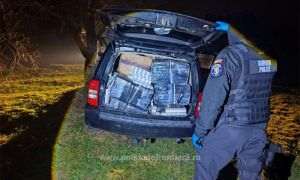• Tourism, a field with huge untapped potential, insufficiently exploited
The economic crisis had a negative effect on the commercial exchanges between Romania and Ireland. After the first nine months of 2009, Ireland"s exports to Romania reached the level of 70.9 million Euros, and Ireland"s imports from Romania amounted to 37.3 million Euros, said Robin Henry, the deputy head of the economic mission of the Irish Embassy in Bucharest. He said that in 2008, Ireland"s exports to Romania amounted to 300 million Euros, and Ireland"s imports from Romania stood at 50 million Euros.
Robin Henry said: "Generally speaking, commercial exchanges between European countries decreased last year, due to the economic crisis. On top of that, the trade relations between Ireland and Romania were also affected by the excessive bureaucracy which delays the business of foreign investors in Romania. The climate for foreign investors could stand to be improved in Romania, in particular by reducing excessive bureaucracy, which prevents new capital inflows, but also creates problems for businesspeople already present on the Romanian market".
In the first nine months of 2009, Irish direct investments amounted to around EUR 20 million. Robin Henry said that the Irish Embassy wants to increase the level of direct Irish investments starting with 2010. Irish investors are attracted by Romania"s tourism sector, in which they are willing to invest consistent amounts as it has a huge potential for growth. However, Romania isn"t doing enough to develop this potential for tourism. It could do more to market itself as a destination for investment and attract foreign investors in general with a package of tax and other incentives along the lines of the Industrial Development Authority (IDA) in Ireland. The low labour costs in Romania are not necessarily enough to attract high value investors. Tax incentives and an educated workforce are also considerations in investment decisions. What"s more, Romania is lacking when it comes to transportation and infrastructure, two factors without which Romanian tourism won"t be able to grow, said Robin Henry. Ireland has the experience and the know-how that businesses in the tourism sector need and it wants to bring them to Romania.
While in the 2007-2008 period the number of Irish investors in Romania increased thanks to the attractiveness of the real estate and construction sector, in 2010 it was the industrial sector, in particular the manufacturing of spare parts for cars, that drew an increased interest compared to the previous years. Another field of interest is consultancy for business and for attracting European post accession funds, the official of the Irish Embassy of Bucharest added. Another sector in which Irish investors are greatly interested is agriculture, in particular stock breeding, given the fact that Romania imports pork and chicken meat.
The crisis affected the liquidity available to European investors and reduced their ability to borrow in order to develop their businesses. The Irish economy is also suffering due to the difficult global economic context, but the Irish government has already taken steps to encourage the economic recovery. Ireland supports lending by helping recapitalize its banks, has programs to increase exports and has cut public spending. Furthermore, Ireland expects to have a slight economic recovery this year.
Robin Henry estimates the commercial exchanges between Romania and Northern Ireland to see a slight turnaround this year. Last year, the products that accounted for most of Romania"s exports were clothing, textiles, telecommunication equipment, furniture and wooden products, as well as chemical products.
In Romania, the most appreciated Irish products are essential oils and fragrances, chemicals, pharmaceutical products, organic chemical products, meat products, industrial machinery, data processing devices and electrical appliances.
Some of the largest Irish companies in Romania include Mivan Development (real estate investments), PM Group (project management for projects financed using European funds), Moritz Holdings (construction and real estate development), RI Investment, Ravensdale Investments (both operating in the real estate sector), Bruce Shaw and Jennings O"Brian (consultancy), Precision Software and Jinny (software), Alphyra and Kingspan.


























































